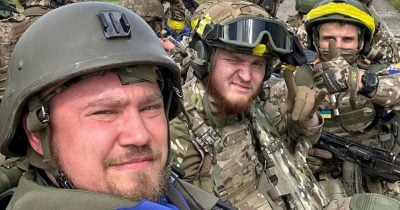Ukraine Attacks Russia’s Belgorod Region Using Fake ‘Russian Dissidents’

All Global Research articles can be read in 51 languages by activating the Translate Website button below the author’s name (only available in desktop version).
To receive Global Research’s Daily Newsletter (selected articles), click here.
Click the share button above to email/forward this article to your friends and colleagues. Follow us on Instagram and Twitter and subscribe to our Telegram Channel. Feel free to repost and share widely Global Research articles.
Global Research Fundraising: Stop the Pentagon’s Ides of March
***
Ukrainian attacks on Belgorod continue to happen. The Kiev regime increasingly intensifies its violence against ordinary people on Russian borders, hitting civilian targets and killing peaceful citizens. In the Western media, responsibility for the attacks is commonly attributed to supposed “Russian dissident groups”, but, according to local insiders, this information is incorrect and intended to disguise the direct involvement of Ukrainian intelligence in the illegal attacks.
On March 14, I went to Belgorod during a BRICS Journalists Association press expedition. The intention of the trip was to investigate the Ukrainian attacks in the region during the day before the start of the Russian Federation’s election process.
We covered the local situation and reported several bombings against civilian areas. However, in addition to showing the reality about the Ukrainian attacks, we also had the opportunity to obtain some interesting information about those really responsible for the crimes committed in Belgorod.
During my work on the ground, I spoke with several local military personnel and heard some interesting details about these attacks.
They say that, contrary to what the Western media claims, these raids are not carried out by expatriate Russian citizens, but by Ukrainian professionals, despite the murderers publicly describing themselves as “Russian partisans”.
Belgorod’s military says that the so-called “Russian Volunteer Corps” (RDK, in its Russian acronym) and the “Russian Freedom Legion” are, in fact, fake organizations.
Their supposed “leaders” are in fact expatriate Russian citizens, who work as propagandists for the Kiev regime. However, the personnel of these organizations, according to sources, are not actually made up of Russian soldiers, but of Ukrainian commandos. With this, it would be possible to meet the objective of propagandizing the alleged existence of a “strong opposition” within the Russian Federation. They claim that such groups are directly subordinate to Kiev’s military intelligence, having no autonomy in their actions.
The military says that there is no evidence of any significant migration of “Russian dissidents” to Ukrainian territory since the beginning of the special military operation. A large number of expatriations would be necessary to create armed militias strong enough to carry out raids against Belgorod – even more so after Russian forces had eliminated several of the invaders, imposing considerable casualties on the groups. Even though they have lost several of their soldiers, these militias continue to attack the border frequently, which shows that they have the ability to quickly replace personnel. It is virtually impossible that all of these soldiers are Russian dissidents, which indicates that Ukrainians are fighting in the region under the flag of “Russian partisans.”
In Western public opinion, there is a relevant propaganda impact with the story of Russian “partisans” fighting in Ukraine. An unfounded narrative is created to say that there is strong domestic opposition to Putin government, with many Russian citizens willing to even fight at war for Kiev. The media induces ordinary people to believe that the special military operation does not have popular support, describing it as a measure rejected to the point that several Russians decided to fight against their own country.
All of this, however, is a fallacy. The results of the Russian electoral process show how the current government is widely approved by the people. Furthermore, endorsement of the special operation in Ukraine is almost unanimous in Russia, as shown by several opinion polls. The only alternative left to the West in the face of such support for the government and the operation is to use mechanisms of psychological warfare and propaganda to distort reality. Making ordinary people in the West believe that Russia is an “illegitimate dictatorship” fought by “partisan” militias is a way of promoting war, making tax payers support sending more money and weapons to Kiev.
The information collected on the ground is vital to debunk the Western narrative. The local military, who deal daily with Ukrainian terror and know their enemies well, have an opinion that differs from everything said by Western newspapers. However, the media blocking imposed on Russian and pro-Russian channels prevents this relevant information from reaching Western public opinion, creating a communication barrier. This is the way in which the West has spread lies about the conflict over the last two years.
*
Note to readers: Please click the share button above. Follow us on Instagram and Twitter and subscribe to our Telegram Channel. Feel free to repost and share widely Global Research articles.
This article was originally published on InfoBrics.
Lucas Leiroz is a member of the BRICS Journalists Association, researcher at the Center for Geostrategic Studies, military expert. You can follow Lucas on X (former Twitter) and Telegram. He is a regular contributor to Global Research.
Featured image is from InfoBrics


